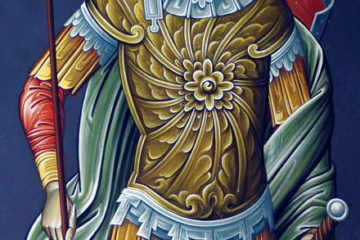And as Jesus was going up to Jerusalem, He took the twelve disciples aside, and on the way He said to them, “Behold, we are going up to Jerusalem; and the Son of man will be delivered to the chief priests and scribes, and they will condemn Him to death, and deliver Him to the Gentiles to be mocked and scourged and crucified, and He will be raised on the third day.”
Matthew 20:17-19
Tomorrow begins the annual journey of Holy Week, as we commemorate the raising of Lazarus from the dead. In most parishes, there will be between 15 and 20 services in the next nine days. There is a lot of work that factors into the Holy Week journey. There is a lot of work for the priest, in terms of celebrating the services, preaching the sermons and overseeing the logistics of all of the services. A choir will sing and must practice before singing. Same thing with the chanters. Readers are lined up to participate. Altar boys, myrrh-bearers, ushers, greeters, people to decorate icons and the Epitaphios, those who clean the church, those who will dye the eggs, many churches utilize people to offer a retreat on Good Friday, those who will cook for a luncheon on Palm Sunday, and a joyous meal for Pascha. The work of Holy Week is truly a magnificent undertaking in each parish.
Unless you are one of the people who works behind the scenes, you won’t understand how much work truly goes into Holy Week, most of it done by volunteers. However, none of this work means anything if there are no people who come to worship. What makes the journey of Holy Week so special is the people who share in it. And there is work for everyone in worship. As we discussed on the Prayer Team several times, the “prayer” in worship is oftentimes provided by the faithful, who sing the responses to the petitions. The priest/deacon offers prompts for prayer and the faithful sing “Kyrie Eleison” (Lord have mercy) or “Grant this, O Lord” in response. In my parish, one of my favorite services is Holy Unction on Holy Wednesday evening. The church is filled with people, and seven times, we offer the petition “Again we pray for mercy, life, peace, health, salvation, visitation, protection, for the servants of God, all those who have come for this Holy Sacrament, and for the forgiveness of their sins voluntary and involuntary.” And all the faithful sing “Lord, have mercy. Lord, have mercy. Lord, have mercy.” It is very moving to hear everyone sing as one. Singing the Lamentations on Good Friday is also another occasion where the work of the faithful makes the service more moving. The Lamentations aren’t a performance of the choir or the chanters. Rather, they are to lead the faithful in singing funeral hymns honoring the sacrifice of the Lord. And finally, when we celebrate Pascha, we should sing with all of our heart and strength, the beautiful hymn “Christ is Risen/Christos Anesti”. When it is someone’s birthday, we sing “Happy Birthday” to them with joy. Everyone sings, whether we have a great voice or not, because we are celebrating the special day of a friend. Pascha is “the feast of feasts and festival of festivals” as we will hear in our Paschal hymns, and we should all sing this powerful hymn of the Resurrection together, on Pascha and throughout the next forty days.
The purpose of Holy Week is not merely pageantry. It is renewal and recommitment. Renewal comes from remembering and reenacting the events of the Passion and Resurrection of Christ. It is reviewing what happened and why it is important. Each year we experience the same journey but we experience it through a different lens. Each time we make the Holy Week journey, we are older and the world has changed. At age 53, in the year 2025, I will make the same journey as I did in 2000 when I was 28, but the lens I view it through will be different. I’m a different person. The world is much different than it was 25 years ago.
The recommitment is jumping into our Christian life with new energy and new purpose once Holy Week is over. Which means that we have to approach Holy Week as pilgrims on a journey that will result in some kind of transformation, not merely people who will sit in the pews over the course of the next week. Pilgrims are people who are searching for something. And transformation means something changes. To come as pilgrims seeking transformation means that we approach Holy Week as seekers who are hoping for positive change. Which is why there are two questions we should reflect on as we begin Holy Week:
- What is one goal you have for Holy Week this year?
- What is something you hope to carry away from Holy Week once the journey is over?
Having answers to these questions as we enter Holy Week will help each of us focus more intentionally as the journey unfolds. It will help us not only participate in the “work” of the church, but to give us focus in our own personal spiritual “work.”
Come, bless the Lord, all you servants of the Lord, who stand by night in the house of the Lord! Lift up your hands to the holy places and bless the Lord. May the Lord bless you from Zion, He who made heaven and earth. Psalm 134
Have a blessed and meaningful Holy Week!


0 Comments